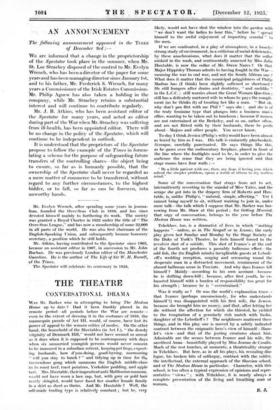THE THEATRE
CONVERSATIONAL DRAMA
Was Mr. Barker wise in attempting to bring :The Madras 'House up to date ? Had it been frankly -placed in its remote period—all periods before the War are remote- eVen to the extent 'of dressing it -in the costumes of 1910, the mannequin parade of Act III. would, of cOurie, have lost its povier of appeal to the women critics of Modes: On the other hand,the household of the Huxtables (in Act L), "_the doirdy virginity Of Denmark Hill," would not-have seemed so unreal as it does when it is supposed tobe contemporary with days when six Unmarried youngish persons would never consent t6 be immured in a suburban retreat, keeping pet frogs; expect= ing husbands, how- d'you-doing, good-byeing, murmuring " will you stay to lunch ? " and tidying up in time for the tremendous gong which summons the English middle-clais . to its roast beef, roast potatoes, Yorkshire pudding, and apple tart. Mrs. Huxtable, their impenitent ant i-Malthusian mamma, would not have worn -a lace cap, but, with-grey or gold hair neatly shingfed, would have faced her smaller female family in a skirt as short as theirs. And Mr. Huxtable ? Well, the self-Made trading type is relatively constant ; but he, very likely, would not hai:e shut the window into the garden with- " we don't want the -ladies to- hear this," before he " spread himself to the awful enjoyment of imparting scandal to
the men. .
If we are confronted, in a plaY of atmosphere, `in a loosely- strung study of environment, in a criticism of social deficiencies, by these anachronisms, what does it matter that the collar mislaid in the wash, and sentimentally annexed by Miss Julia Huxtable, is now the collar --of Mr. Owen .1■Tares. ?, Or that Major Hippisley Thomas admits to having fought inthe War— meaning the war to end war, ancinot the South African one ? What does it:matter that the municipal priggishness of Philip Madras has (I think) been •slightly. softened. or shortened ? He still hungers after drains and dentistry, " And suchlike in the L.C.C. ; still worries about the Great Woman Question ; still has a delicately nurtured wife to whom he pays the compli- ment (as he thinks it) of treating her like a man. " But oh, Why don't you flirt with me Phil ?." says she ; and she is of the truly feminine type that plunges into a business man's office, wanting to be taken out to luncheon ; because if women are not entertained at the Berkeley, and so on, rather often, and are not flirted with by their husbands, there be perils about—Majors and other people. You never know. - To-day I think Jessica (Philip's wife) would have been almost as boredby him as I was.- 'His talk-is eminently playbookish, livrei4ue, carefully punctuated. He says things like this, as he gazes over the rudimentary fireplace, placed in front of the line where the footlights used to be,' in order to give the audience the sense that they are being ignored and that stage rooms have four walls :--- - " Be a little patient with me, then, my dear, if loving you, which solved the simpler peoblem, opens a world of others to my restless Some of the conversation that strays from, act to act, . intermittently reverting to the scandal of Miss Yates, and the scrape she got into in the drapery firm of Roberts'and Hux; table, is,unlike- " natural, simple; affecting." -Yet I cannot bring myself to ;without Wanting to join in, under meretalk---The talk which I suppose that Mr. Barker was bor- rowing from Mr. Shaw at this .period ; for Getting- Married, that orgy of conversation, belongs to the year 'before The M.Th.!! House was written. Tchekhov; too, is a dramatist of lives in which "nothing happens "—unless, as in The Seagull or in Ivanov, the early play given last Sunday and Monday by the Stage Society at the Duke of York's Theatre, he' feels himself foreed to the revolver shot of a suicide. This shot- of Ivatiov's at the end Of the' -fOurth act- produces A passably ludicroUs -effect—the Odd- fish, the (inEnglish minds) inexplicable guests at Lehedi- eff's wedding reception, surging and screaming round the desperate_man in a distracted movement, reminiscent of the absurd ballroom scene in Traviala. And why does Ivanov kill himself ? Mainly—according to his own account—because he is drifting down-hill ; _ because, after first youth, he ex- hausted hiniself with a burden of responsibility too great for his strength; because -he is " overstrained.'.' .
Was it really so ? , Or was the world's explanation truer— that . Ivanov (perhaps unconsciously,- for who understands himself ?) was disappointed with his first wife, the Jewess, because she brought him no nionejr,-And that, after letting her .die without the affection for which she thirsted, he yielded to the temptation of a, genuinely rich match with Sasha, 'daughter of the- Lebedieff's ? - The neighbours muttered these things,• and in this play- one is moved by a subtly indicated Contrast between the enigmatic: hero's liew.Oi himself—Ham- let's viewand that of the jeering creatures about him. Admirable are the scenes between Ivanov-and his wife, the .sacrificed Anna—beautifully played by Miss Jeanne de Casalis. Much of the rest touches, at moments, a theatricality strange in Tchekhov. But here, as in all his plays, his revealing dia- logue, his broken. bits of soliloquy, contrast with the colder, the intellectual, the external approach of the Shavian school, and of The Madras House in particular. Character, with this school, is too often. a typical expiession of opinions and repre- sentative " views ", ; with ,Tchekhov, it is nearly always a complete presentation of the living and breathing man or -woman, R. J.






















































 Previous page
Previous page